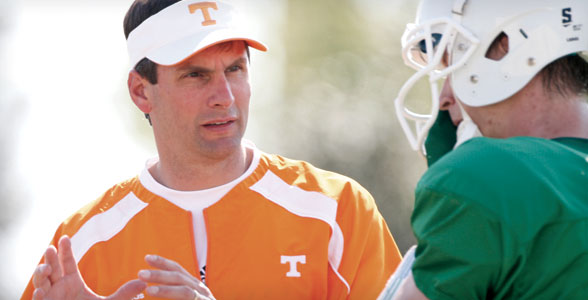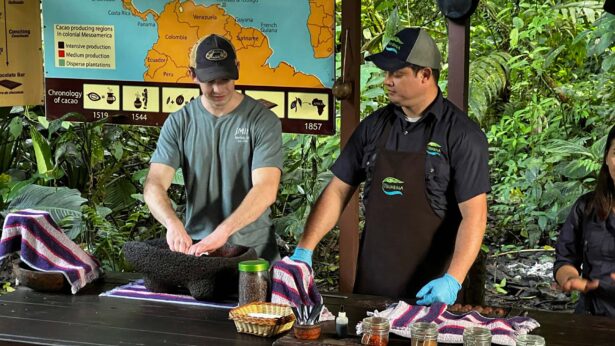By Gina Stafford
Derek Dooley’s path from wide receiver to lawyer to football coach is well documented. So are a couple of the high-profile influences he’s had: his father, Vince Dooley, and his former boss, Nick Saban.
Now in his first season as head football coach of the Volunteers, Derek Dooley is applying wisdom learned from mentors and his 14 years of experience to game management, coaching philosophy, team building, and internal organizational structure.
“What most people think of that you do as a coach came from all the coaches I’ve been around,” Dooley says. “But there’s this whole other segment over here that’s just me.”
That would be his emphasis on character development, the need for which he says arises from “the paradox of football”—and which drives his process.
“I’ve watched it. We love this guy in a helmet. We hate this guy when he’s not in a helmet, but everything he’s doing when he’s not in a helmet is the reason we love him when he’s in a helmet,” Dooley says. “If you don’t help shape them and train them to be gentlemen off the field, why are you surprised when they’re not?
“When they take the helmet off, they’ve got to switch it. Most people don’t understand why that would be a hard thing to do, but it becomes who they are. You’re training a personality over here as a competitor, as a warrior, but when you get off the field, it’s OK to be respectful and vulnerable and compassionate.
“It’s the great paradox nobody talks about. Nobody’s ever really told me that. All that has come from my personal experience.”
And that isn’t solely his experience as a coach.
“I needed what I’m putting in when I was twenty-two,” Dooley says. “I was as blessed as a child as any young man could be blessed. I had two parents who were both honorable, spiritual people who taught me right from wrong, but at the end of the day, I was as big a mess as any other eighteen- to twenty-two-year-old.
“Boys who play football, especially from eighteen to twenty-two, when they get here, they have a hole in their head when it comes to doing right—they do. They need that continuing education and shaping.”
Football can be “a vehicle to help shape better men,” Dooley says, and the Vol For Life program is his plan for doing that.
“I believe that’s what football can do, but it can do it only if a coach believes in it,” he says. “Having said that, you know everybody wants to go to the NFL, but what everybody’s ultimately going to have to go to is the VFL—they’re going to be a Vol For Life. The Vol For Life program is helping shape them, when football is over, as people.”
Andre Lott, a Tennessee captain and four-year letterman from 1997 to 2001, is coordinating the program. Through it, Dooley’s Vols get character education that lays out issues, choices, and consequences. The program also teaches a wide range of practical “life skills”—social graces, job interviewing, basic financial concepts, and so on. It’s designed to help those who grew up with guidance and those who didn’t.
“It’s about breaking down some of the challenges of today: entitlement, self-gratification, bulletproof—and I was right there. I’ve had all those characteristics,” Dooley says. “What you learn over time is it’s a path to destruction. Sometimes it takes people twenty years to figure it out. Sometimes it takes them forty. Sometimes they never do.”
While Dooley acknowledges a character education program will have its fans, he’s well aware of the expectations Tennessee fans have for the Vol football program. He notes that coaches get the most out of their teams and players when two factors are present: “Number one, they’ve got to know you care about them as people,” Dooley says. “Number two, they’ve got to believe you can really help them play better, and that comes with them believing in your knowledge and expertise of the game.”
As a coach, he says, he’s more “process oriented” than “outcome oriented.” He focuses on the elements involved in winning rather than on just wins or losses.
“I was never on a career path. I was just coaching, trying to do the best job I could no matter what my role,” Dooley says. “When I was a G.A. at Georgia for (defensive coordinator) Joe Kines and he asked me to go get him a cup of coffee, I wanted it to be the best cup of coffee he’d ever gotten. All I’ve cared about was enjoying the job I have and recognizing your attitude really dictates how you feel every day about your job.
“I feel that way as a coach—I’ve never been outcome oriented. I’m more process oriented: What can I do to become a good coach? Not I want to win. Well, hell, everybody wants to win. What are you doing to win? You can get so focused on the end result that you lose the things you need to do to achieve the result. And I believe winning is the by-product of the process.”
Dooley is quick to point out the changes he is making to put Tennessee football back on top are not new to the program.
“We’ve done that here. Coach Fulmer did it. Coach Majors did it,” he says. “And of course, since General Neyland came on campus eighty-four years ago, there’s no program in college football that has more wins than Tennessee, which is an incredible stat. So clearly, this is a special place, but we lost it a little and we’ve got to recognize that before we can change it.
“To win SEC and national championships takes a total team effort, and everybody plays a role in our team. Certainly the coaches and our football staff play an important role, but the president, the chancellor, the vice-provost for academics, our faculty athletics representative, our admissions director, our director of the Thornton Center, our donors, our lettermen, alumni, fans, and our students all play a role in helping the program move forward.”
For those who’ve known nothing else, it may be easy to take for granted the university’s global alumni network, or the fact that 100,000 fans will flock to Rocky Top on football Saturdays. Not Dooley.
“I’ve been at places where they don’t have support,” he says. “Everybody needs to be at those kinds of places—to appreciate this. Fans don’t always know Xs and Os, but they do know when a team is playing their heart out for each other and for the university, and they’re laying it on the line every second, and they’re doing it with class and professionalism.
“That’s what I hope they’ll see in our teams as time goes.”
And if Derek Dooley is right about his process—and he’s confident he is—the wins should follow.
– – –
Gina Stafford (’07) is assistant vice-president and director of communications for the UT system.



